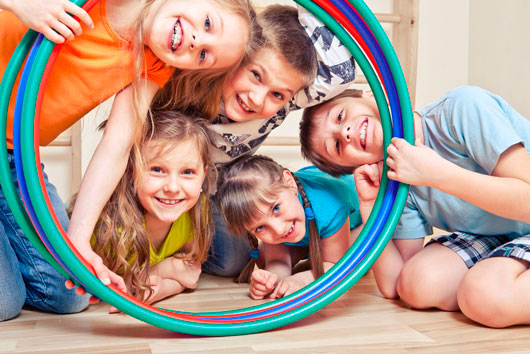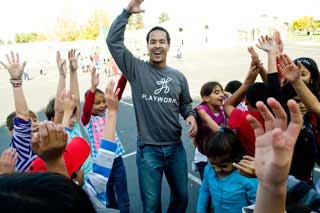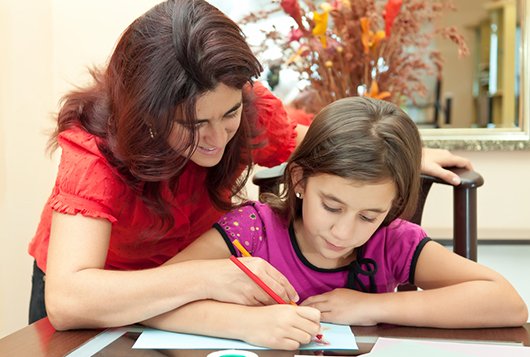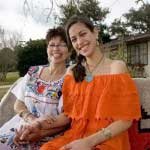
Researchers have found that investing in recess and organized play can prevent bullying, improve students’ behavior at recess and readiness for class, and provide more time for teaching and learning. Playworks, a national nonprofit that provides coaches who implement healthy recess and other playtime to schools in 23 cities nationwide was the focus of this research. The new study from Mathematica Policy Research and Stanford University specifically looked at what happened on the playground and throughout the school day when schools partnered with the program.
San Francisco’s Mission District, home to a large Latino population, has nine schools that participate in Playworks and have seen first-hand what the research has proven.
“We’ve started a before-school recess program at many of our schools with predominantly Latino populations so we can engage those parents walking with their children to and from school,” says Bill Vanark, a Playworks program director who oversees 26 elementary schools in San Francisco.
Read Related: 6 Things Parents Should Know About Bullying
Before the school day even starts, Playworks coaches, or program coordinators, get the kids’ heart rates up and get them active with their parents.
 “We’ve noticed that attendance rates have gone up and tardiness has gone down just by creating this opportunity for families to play together before the school day begins,” continues Vanark.
“We’ve noticed that attendance rates have gone up and tardiness has gone down just by creating this opportunity for families to play together before the school day begins,” continues Vanark.
According to the study, teachers reported that Playworks students were more likely to have better behavior and attention in the class after sports, games and play. Teachers in Playworks schools also perceived that students felt safer and more included at recess and nearly 100 percent reported that they wanted the program in their school again the following year.
Gilbert Marquez, or Coach Gilly as the kids call him, is a program coordinator at Griegos Elementary School in Albuquerque.
“We are a large Hispanic community here in New Mexico, so my students tend to be of Latino background,” says Marquez. “But Playworks creates a more inclusive, inviting environment for kids of all backgrounds, sizes and experiences to get more active during the recess time and throughout the school day.”
Marquez adds, however, that “the behavioral issues being addressed during the school day are what really impact our Latino students” and it has improved “their attention and interaction with their teachers and with the other students—as well as their overall participation scholastically.”
Source: playworks.org
Recess and other school-based play time are some of the least studied elements of the school day. Principals and teachers often say, however, that a bad recess period has a negative effect on the entire school day. This new research, sponsored by the Robert Wood Johnson Foundation, contributes to a growing body of evidence that a safe, healthy recess environment is a key driver of better behavior and learning.
“We’ve noticed that the community of play has stretched beyond the school boundaries,” Vanark says about the nine schools in San Francisco’s Mission District. “We organize different Saturday events for our families and call them extravaganzas. They’re sports clinics, but clinic is a word that has lots of different meanings. We use the word extravaganza to make it sound like a fun-filled day, teaching boys and girls how to play soccer and basketball.”
Additionally, through Playworks’ leadership program there are junior coaches made up of fourth- and fifth-grade students who are trained to implement safe and inclusive play with their younger peers.
“It is more engaging than the adults and even my trained professionals are when we get kids to engage other kids,” says Vanark. “Whether it’s a game of dodgeball or double dutch, they are with the fourth- and fifth-grade students who, on a rotational basis, actually go out and run those activities. That way every kid knows how to play the games and the older kids, who are actually recruiting younger kids into the games, create a space where they own their own playing.”
School time is about learning and should not be fogged by bullying or a non-inclusive recess time. Playworks has been successful in creating an environment within the school day that makes children and families feel more included and where negative behaviors are substantially reduced.
“For our education system to succeed, our schools need to be able to create the conditions for learning,” said Jill Vialet, CEO and founder of Playworks and one of Forbes’ Impact 30, a list of the 30 most influential social entrepreneurs. “The good news is that we’ve developed a model that can be replicated almost anywhere and produces positive and measurable results.”
[vimeo]http://vimeo.com/5704283[/vimeo]











Leave a Reply
Want to join the discussion?Feel free to contribute!